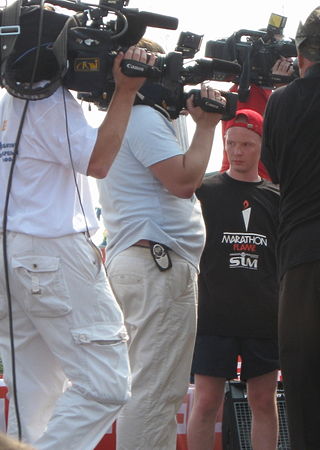Siberian International Marathon
From Wikipedia, the free encyclopedia
Siberian International Marathon (SIM; Russian: Сибирский международный марафон) is a marathon road race held in Omsk, Russia, since 1990 as part of the City Days festivities. It takes place during the week of St. Ilya's Day, the patron saint of Omsk, in early August. The winter half-marathon is during the January 7 Orthodox Christmas week.
| Siberian International Marathon | |
|---|---|
 Aleksei Tishchenko promoting the 2010 Siberian International Marathon | |
| Date | First Saturday in August |
| Location | Omsk, Siberia, Russia |
| Event type | Road |
| Distance | Marathon, 10K run |
| Established | 1990 |
| Course records | Men's: 2:13:03 (1993) Eduard Tukhbatullin Women's: 2:30:21 (2002) Albina Mayorova |
| Official site | Siberian International Marathon |
| Participants | 378 finishers (2021) 462 finishers (2019) |
The race date was moved forward a week in 2012 so that the start time exactly coincided with that of the 2012 Olympic men's marathon held in London.[1] It was delayed until September in 2013 due to the 2013 World Championships in Athletics being held in Moscow during that period.
It was organised in 1990 by Dmitri Khodko and Sergei Govrilov as an attempt to open Omsk to foreigners. The foreign participation was headed by Claude Fisicaro, an Australian living in London, through a running club called World Runners, who ran in aid of ending hunger. Later directors of the Los Angeles Marathon and the New York City Marathon actively participated in the early years of the Siberian International Marathon. The first marathon was attended by 1800 athletes, including 32 foreigners from 9 countries one of which was British MP John Austin-Walker, and a Kenyan marathon runner who due to flight difficulty arrived the morning of the marathon. Since the early 1990s, the marathon has attracted thousands of participants each year and the number is growing annually.
It is designated as an World Athletics Bronze Label Road Race, making it the only such competition in the country to hold World Athletics status.[2] In spite of its international nature, only one foreign athlete (Cosmas Musyoka of Kenya) topped the podium at the competition between 1990 and 2010.
The 2020 and 2022 races were held virtually because of the COVID-19 pandemic and the Russian invasion of Ukraine, respectively.
Events
The events for the Siberian International Marathon include:
- Marathon (42 km 195m - distance is certified by the AIMS). First ten women and men receive monetary prizes.
- Wheelchair marathon (42 km 195m). First ten women and men receive monetary prizes.
- Marathon relay (42 km 195m; six participants; legs of 5, 10, 5, 10, 5, and 7.195 kilometer). First three male and female teams receive monetary prizes.
- Speedskating marathon (42 km 195m). Marathon on in-line skates. First three receive monetary prizes.
Past winners
Summarize
Perspective
NOTE: no race in 2020 nor 2022.

Key: Course record
| Edition | Year | Men's winner | Time (h:m:s) | Women's winner | Time (h:m:s) |
|---|---|---|---|---|---|
| 1st | 1990 | 2:17:48 | 2:42:13 | ||
| 2nd | 1991 | 2:16:54 | 2:38:46 | ||
| 3rd | 1992 | 2:17:28 | 2:32:15 | ||
| 4th | 1993 | 2:13:03 | 2:38:20 | ||
| 5th | 1994 | 2:17:05 | 2:33:49 | ||
| 6th | 1995 | 2:14:37 | 2:32:21 | ||
| 7th | 1996 | 2:15:20 | 2:35:16 | ||
| 8th | 1997 | 2:15:54 | 2:35:22 | ||
| 9th | 1998 | 2:19:15 | 2:31:44 | ||
| 10th | 1999 | 2:15:14 | 2:35:09 | ||
| 11th | 2000 | 2:18:05 | 2:34:07 | ||
| 12th | 2001 | 2:20:43 | 2:33:08 | ||
| 13th | 2002 | 2:17:38 | 2:30:21 | ||
| 14th | 2003 | 2:17:40 | 2:40:16 | ||
| 15th | 2004 | 2:14:44 | 2:39:53 | ||
| 16th | 2005 | 2:20:23 | 2:39:14 | ||
| 17th | 2006 | 2:16:41 | 2:38:40 | ||
| 18th | 2007 | 2:18:39 | 2:39:00 | ||
| 19th | 2008 | 2:15:29 | 2:33:41 | ||
| 20th | 2009 | 2:15:06 | 2:34:52 | ||
| 21st | 2010 | 2:17:06 | 2:39:45 | ||
| 22nd | 2011 | 2:14:25 | 2:37:22 | ||
| 23rd | 2012 | 2:49:06 | 2:44:47 | ||
| 24th | 2013 | 2:13:23 | 2:31:50 | ||
| 25th | 2014 | 2:14:50 | 2:38:53 | ||
| 26th | 2015 | 2:18:18 | 2:34:14 | ||
| 27th | 2016 | 2:21:34 | 2:36:13 | ||
| 28th | 2017 | 2:18:58 | 2:39:20 | ||
| 29th | 2018 | 2:17:03 | 2:36:25 | ||
| 30th | 2019 | 2:19:56 | 2:35:50 | ||
| 31st | 2021 | 2:15:39 | 2:29:11 | ||
| 32nd | 2023 | 2:15:03 | 2:35:42 | ||
| 33rd | 2024 | 2:17:04 | 2:34:34 |
See also
References
External links
Wikiwand - on
Seamless Wikipedia browsing. On steroids.
